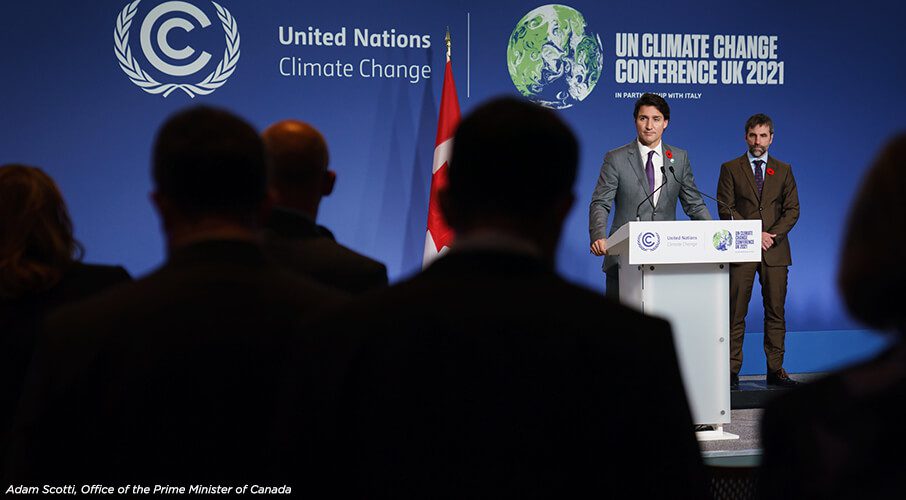
In an ironic twist that has been missing from the debate, active engagement in the green economy requires more resource development, not less, writes Ken Coates. We must be prosperous if we are to lead a green transition.
By Ken Coates, November 3, 2021
Discussions on climate change have all the finesse and charm of a junior high school dance. Everyone dresses nicely, chaperones are in place, a DJ orchestrates the event—but the participants sit uneasily on the sidelines, chattering amongst themselves and too nervous to take the first step.
COP26 is shaping up to be just such an event. National governments play the role of the principals, setting out the ground rules but leaving the real action for others. Environmental groups, the chaperones, give earnest and profound speeches about the need for urgency and dramatic action. But the citizens, the ones most affected by the planning and strategizing, sit in the bleachers, unsure of the first steps, bothered by the chaperones, and paying little attention to the principals. And like those excruciating dances, suffused with hormones and awkwardness, at the end of the day virtually nothing happens.
Given the need for urgent action on climate change, breaking the impasse and starting this dance has become essential. Moving from performative gestures to meaningful action is a global challenge.
Particularly so for Canada.
Moving forward requires a much more refined understanding of the relationship between natural resource development, Canada’s role in the world economy, and the behaviour and expectations of citizens. Without these, the climate debate in Canada and elsewhere will wallow in good intentions and shallow accomplishments. There are significant steps that have the potential to bring about meaningful change.
Increase the national investment in nuclear power—and do so with haste. Canada is a world leader in the production of uranium. We need to embrace nuclear energy as one of the safest, cleanest sources of energy needed to replace fossil fuels. Small modular reactors have considerable promise and work in this area should be fast-tracked. This must become a top national priority.
The green economy relies on a steady and secure supply of critical minerals. Canada has them in abundance—but also has one of the most convoluted regulatory environments in the world. Canada needs to expedite production of these minerals, coordinate Canadian output with the global demand of our allies, and invest in the processing and manufacturing associated with these minerals. The 21st century economy relies on critical minerals. Canada can, in this manner, establish a firm, long-term place in the renewable energy economy.
Moving from performative gestures to meaningful action is a global challenge.
Canada must understand the global place of its natural resource production. Canadian oil and gas can support the efforts of East and South Asia to displace coal-based energy consumption. Specialized minerals are urgently needed to underpin the transition to renewable resources. The country’s water, hydroelectric, and forestry resources also have global significance and must be developed carefully and in the interests of the people of Canada. In an ironic twist that has been missing from the debate, active engagement in the green economy requires more resource development, not less.
If the citizens are to be brought along on this journey, economic opportunity must continue. Social programs require sustainable funding—and so do the massive investments needed for a meaningful green transition. Canadian development has become investment-averse due to an outsized regulatory burden which must be corrected. Moreover, prioritizing clear growth targets, such as the doubling of Canada’s GDP by 2050, will be crucial to keep the public on board with ambitious climate goals. Simply put, we must be prosperous if we are to lead a green transition.
Perhaps most importantly, the country needs to learn to stand up to the comparatively small number of activists with out-sized impact in creating the status quo. Their passion and commitment are admirable, and their ideas have educated Canadians about the real threat of ignoring the environment. But the negative, anti-development ethos that has accompanied sage advice about the environment actually stops Canada from responding constructively. Being practical about climate change requires urgent action of course, but that action includes developing the resources and infrastructure necessary to actually transition.
The soft mush of the last federal election provided no serious direction for the difficult decisions that our country must make. All parties focused on expanding government services to citizens without articulating a coherent economic vision for the country. No party outlined a strategy of constructive engagement with 21st century realities that could keep the country economically strong while making real contributions to combat climate change.
Opportunities exist for Canada to become a major global player; our current strategy, however, is sending us headstrong to national mediocrity, inaction on meaningful climate change initiatives, and to a lower quality of life. This is not the outcome that Canadians desire.
Ken Coates is a Munk Senior Fellow with the Macdonald-Laurier Institute.





